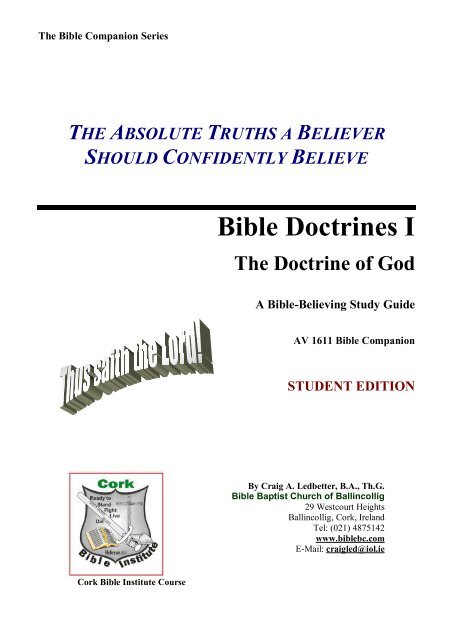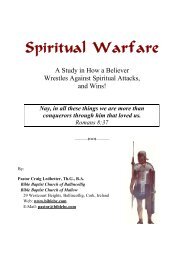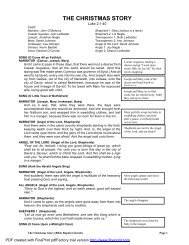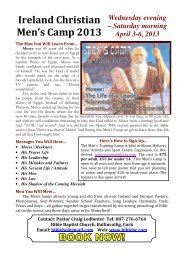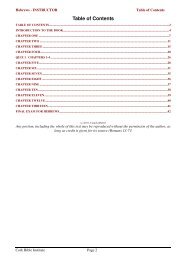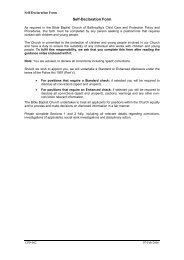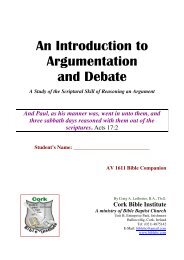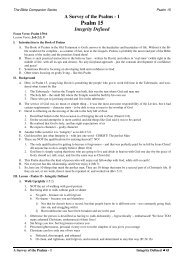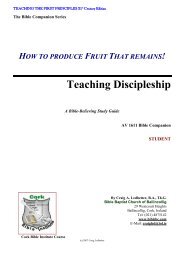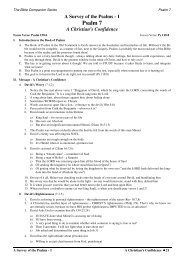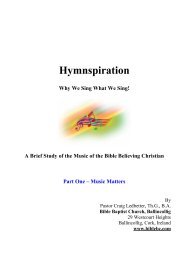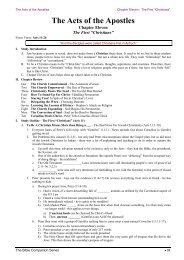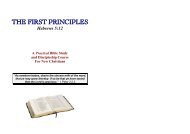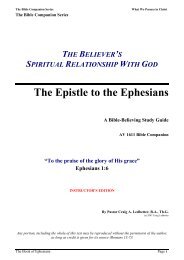The Doctrine of God - Bible Baptist Church
The Doctrine of God - Bible Baptist Church
The Doctrine of God - Bible Baptist Church
You also want an ePaper? Increase the reach of your titles
YUMPU automatically turns print PDFs into web optimized ePapers that Google loves.
<strong>The</strong> <strong>Bible</strong> Companion Series<br />
THE ABSOLUTE TRUTHS A BELIEVER<br />
SHOULD CONFIDENTLY BELIEVE<br />
<strong>Bible</strong> <strong>Doctrine</strong>s I<br />
<strong>The</strong> <strong>Doctrine</strong> <strong>of</strong> <strong>God</strong><br />
A <strong>Bible</strong>-Believing Study Guide<br />
AV 1611 <strong>Bible</strong> Companion<br />
STUDENT EDITION<br />
By Craig A. Ledbetter, B.A., Th.G.<br />
<strong>Bible</strong> <strong>Baptist</strong> <strong>Church</strong> <strong>of</strong> Ballincollig<br />
29 Westcourt Heights<br />
Ballincollig, Cork, Ireland<br />
Tel: (021) 4875142<br />
www.biblebc.com<br />
E-Mail: craigled@iol.ie<br />
Cork <strong>Bible</strong> Institute Course
<strong>Bible</strong> <strong>Doctrine</strong>s 1 – <strong>The</strong> <strong>Doctrine</strong> <strong>of</strong> <strong>God</strong><br />
Table <strong>of</strong> Contents<br />
Doctrinal Series Introduction.........................................................................................................................................4<br />
I. THE EXISTENCE OF GOD......................................................................................................................................5<br />
A. Some philosophical arguments for the existence <strong>of</strong> <strong>God</strong>.............................................................5<br />
B. Scriptural arguments for the existence <strong>of</strong> <strong>God</strong>. __________.......................................................5<br />
II. THE DEFINITION OF GOD....................................................................................................................................5<br />
III. THE NAMES OF GOD............................................................................................................................................5<br />
A. __________...............................................................................................................................5<br />
B. _____.........................................................................................................................................5<br />
C. ________: Master, Lord.............................................................................................................5<br />
D. __________...............................................................................................................................6<br />
IV. THE NATURE OF GOD..........................................................................................................................................6<br />
A. <strong>God</strong> is _________......................................................................................................................6<br />
B. <strong>God</strong> is a _________....................................................................................................................6<br />
C. <strong>God</strong> is ______............................................................................................................................6<br />
D. <strong>God</strong> is a _________....................................................................................................................6<br />
V. THE ATTRIBUTES OF GOD...................................................................................................................................7<br />
A. <strong>God</strong> is _______________...........................................................................................................7<br />
B. <strong>God</strong> is ___________________...................................................................................................7<br />
C. <strong>God</strong> is ___________...................................................................................................................7<br />
D. <strong>God</strong> is ____________. ...............................................................................................................7<br />
E. <strong>God</strong> is ________________.........................................................................................................7<br />
F. <strong>God</strong> is ____________ (all-powerful)...........................................................................................7<br />
G. <strong>God</strong> is _____________ (all-knowing). .......................................................................................7<br />
H. <strong>God</strong> is ___________..................................................................................................................8<br />
I. <strong>God</strong> is immutable. (unchangeable)...............................................................................................8<br />
J. <strong>God</strong> is _______________............................................................................................................8<br />
M. <strong>God</strong> is _________......................................................................................................................8<br />
N. <strong>God</strong> is ______________ and just................................................................................................9<br />
O. <strong>God</strong> is _______..........................................................................................................................9<br />
P. <strong>God</strong> is ______________.............................................................................................................9<br />
Q. <strong>God</strong> is __________....................................................................................................................9<br />
R. <strong>God</strong> is _________. .....................................................................................................................9<br />
S. <strong>God</strong> is merciful...........................................................................................................................9<br />
T. <strong>God</strong> is ___________................................................................................................................. 10<br />
U. <strong>God</strong> is __________.................................................................................................................. 10<br />
VI. GOD AS FATHER.................................................................................................................................................10<br />
A. He is the Father <strong>of</strong> all life......................................................................................................... 10<br />
B. He Is the Father <strong>of</strong> Our Lord Jesus Christ................................................................................. 10<br />
C. He Is the Father <strong>of</strong> All Believers............................................................................................... 11<br />
Conclusion....................................................................................................................................................................11<br />
Exam Questions for THE DOCTRINE OF GOD........................................................................................................12<br />
This study is based upon <strong>Bible</strong> Institute materials published by B.A.M.A. <strong>Bible</strong> Institutes Inc. (<strong>Baptist</strong><br />
Asian Missions Association Inc.) and is edited and republished by Pastor Craig Ledbetter with<br />
permission.<br />
Cork <strong>Bible</strong> Institute 2007 Page 2
<strong>Bible</strong> <strong>Doctrine</strong>s 1 – <strong>The</strong> <strong>Doctrine</strong> <strong>of</strong> <strong>God</strong><br />
A Note Concerning the Cork <strong>Bible</strong> Institute<br />
Doctrinal Series Introduction<br />
This study course is intended to be used in conjunction with the Cork <strong>Bible</strong> Institute and contains a<br />
Final Exam that can be applied towards credit in the Institute.<br />
Class Textbook:<br />
<strong>The</strong> following two textbooks are recommended for each student to purchase, and read:<br />
<strong>The</strong> Great <strong>Doctrine</strong>s <strong>of</strong> the <strong>Bible</strong>, by William Evans<br />
<strong>The</strong>ological Studies, Volume 1, by Dr. Peter S. Ruckman<br />
Class Project:<br />
To pass this course, you will need to write a three page summary <strong>of</strong> one <strong>of</strong> the attributes <strong>of</strong> <strong>God</strong> that<br />
most impresses you.<br />
Cork <strong>Bible</strong> Institute 2007 Page 3
<strong>Bible</strong> <strong>Doctrine</strong>s 1 - <strong>The</strong> <strong>Doctrine</strong> <strong>of</strong> <strong>God</strong><br />
Doctrinal Series Introduction<br />
A. What Is <strong>Doctrine</strong>?<br />
Study Outline – <strong>Bible</strong> <strong>Doctrine</strong>s I<br />
<strong>The</strong> <strong>Doctrine</strong> <strong>of</strong> <strong>God</strong><br />
Doctrinal Series Introduction<br />
______________________________________________________________________________<br />
______________________________________________________________________________<br />
B. Why Study <strong>Bible</strong> <strong>Doctrine</strong>?<br />
1. <strong>The</strong> Old Testament And <strong>Doctrine</strong><br />
2. Jesus And <strong>Doctrine</strong> (Matthew 7:28-29)<br />
3. <strong>The</strong> Early <strong>Church</strong> And <strong>Doctrine</strong> (Acts 2:42)<br />
4. <strong>The</strong> Apostle Paul And <strong>Doctrine</strong><br />
5. <strong>The</strong> Apostle John And <strong>Doctrine</strong><br />
C. What <strong>Doctrine</strong>s Should Be Mastered by all believers?<br />
1. _____________________________________<br />
2. _____________________________________<br />
3. _____________________________________<br />
4. _____________________________________<br />
5. _____________________________________<br />
D. Previously Learned <strong>Doctrine</strong><br />
1. You should have already learned some <strong>of</strong> this material from the First Principles Discipleship<br />
Course, and therefore some will be a repeat<br />
2. This material goes into much more detail though.<br />
Cork <strong>Bible</strong> Institute 2007 Page 4
<strong>Bible</strong> <strong>Doctrine</strong>s 1 – <strong>The</strong> <strong>Doctrine</strong> <strong>of</strong> <strong>God</strong><br />
I. THE EXISTENCE OF GOD.<br />
THE DOCTRINE OF GOD<br />
I. THE EXISTENCE OF GOD.<br />
<strong>The</strong> greatest and most pr<strong>of</strong>ound idea the human mind can ever conceivably entertain concerns the<br />
possibility <strong>of</strong> the existence <strong>of</strong> a personal <strong>God</strong>. <strong>The</strong> sheer importance <strong>of</strong> man’s response to this idea cannot<br />
be exaggerated, for it will not only govern his life down here but also determine his ultimate destiny.<br />
Unless one satisfactorily answers the who question, he cannot possibly solve the how, why, when, and<br />
where problems <strong>of</strong> his own existence.<br />
A. Some philosophical arguments for the existence <strong>of</strong> <strong>God</strong>.<br />
1. <strong>The</strong> universal belief argument:<br />
2. <strong>The</strong> cosmological argument:<br />
3. <strong>The</strong> ontological argument:<br />
4. <strong>The</strong> anthropological argument:<br />
B. Scriptural arguments for the existence <strong>of</strong> <strong>God</strong>. __________<br />
II. THE DEFINITION OF GOD.<br />
III. THE NAMES OF GOD.<br />
A. __________<br />
B. _____<br />
1. Elyon: <strong>The</strong> strongest strong One.<br />
2. Roi: <strong>The</strong> strong One who sees.<br />
3. Shaddai: <strong>The</strong> almighty One.<br />
4. Olam: <strong>The</strong> everlasting <strong>God</strong>.<br />
C. ________: Master, Lord.<br />
Cork <strong>Bible</strong> Institute 2007 Page 5
<strong>Bible</strong> <strong>Doctrine</strong>s 1 – <strong>The</strong> <strong>Doctrine</strong> <strong>of</strong> <strong>God</strong><br />
D. __________.<br />
1. Jireh: <strong>The</strong> Lord will provide.<br />
2. Nissi: <strong>The</strong> Lord, my Banner.<br />
3. Shalom: <strong>The</strong> Lord is Peace.<br />
4. Sabaoth: <strong>The</strong> Lord <strong>of</strong> hosts.<br />
5. Maccaddeschcem: <strong>The</strong> Lord thy Sanctifier.<br />
6. Rohi (Raah): <strong>The</strong> Lord my Shepherd.<br />
7. Tsidkenu: <strong>The</strong> Lord our Righteousness.<br />
8. Shammah: <strong>The</strong> Lord who is present.<br />
9. Rapha: <strong>The</strong> Lord our Healer.<br />
IV. THE NATURE OF GOD.<br />
A. <strong>God</strong> is _________.<br />
B. <strong>God</strong> is a _________.<br />
1. He creates.<br />
2. He destroys.<br />
3. He provides.<br />
4. He promotes.<br />
5. He cares.<br />
6. He hears.<br />
7. He hates.<br />
8. He grieves.<br />
9. He loves.<br />
C. <strong>God</strong> is ______.<br />
D. <strong>God</strong> is a _________.<br />
1. False views concerning the Trinity.<br />
<strong>The</strong>re are two serious errors about the doctrine <strong>of</strong> the Trinity.<br />
a. <strong>The</strong> error <strong>of</strong> tri-theism. This says that the Trinity consists <strong>of</strong> three separate (but co-operating)<br />
<strong>God</strong>s.<br />
b. <strong>The</strong> error <strong>of</strong> modalism. According to this view there is but one <strong>God</strong> who simply reveals<br />
himself through three different modes, or roles. For example, a particular man could be<br />
considered a husband to his wife, a father to his children, and an employee to his boss.<br />
2. Proposed illustration demonstrating the Trinity.<br />
3. Old Testament passages regarding the Trinity.<br />
Cork <strong>Bible</strong> Institute 2007 Page 6
<strong>Bible</strong> <strong>Doctrine</strong>s 1 – <strong>The</strong> <strong>Doctrine</strong> <strong>of</strong> <strong>God</strong><br />
V. THE ATTRIBUTES OF GOD.<br />
4. New Testament passages regarding the Trinity.<br />
5. A scriptural summary <strong>of</strong> the Trinity.<br />
a. <strong>The</strong> Father is <strong>God</strong> (Jn. 6:44-46; Rom. 1:7; 1 Pet. 1:2).<br />
b. <strong>The</strong> Son is <strong>God</strong> (Isa. 9:6; Jn. 1:1; 20:28; 1 Tim. 3:16; Titus 2:13; Heb. 1:8).<br />
c. <strong>The</strong> Spirit is <strong>God</strong> (Acts 5:3, 4; Heb. 9:14).<br />
V. THE ATTRIBUTES OF GOD.<br />
We now consider some twenty-one attributes or perfections <strong>of</strong> <strong>God</strong>.<br />
A. <strong>God</strong> is _______________.<br />
B. <strong>God</strong> is ___________________.<br />
C. <strong>God</strong> is ___________.<br />
I AM THAT I AM<br />
D. <strong>God</strong> is ____________.<br />
E. <strong>God</strong> is ________________.<br />
F. <strong>God</strong> is ____________ (all-powerful).<br />
1. Over nature.<br />
2. Over men.<br />
3. Over angels.<br />
4. Over Satan (Job 1:12; 2:6).<br />
5. Over death.<br />
G. <strong>God</strong> is _____________ (all-knowing).<br />
1. He sees all things.<br />
2. He knows all things (the big and small <strong>of</strong> his universe).<br />
3. He knows mankind.<br />
4. He knows the. past, present, and future.<br />
5. He knows what might or could have been.<br />
Cork <strong>Bible</strong> Institute 2007 Page 7
<strong>Bible</strong> <strong>Doctrine</strong>s 1 – <strong>The</strong> <strong>Doctrine</strong> <strong>of</strong> <strong>God</strong><br />
V. THE ATTRIBUTES OF GOD.<br />
H. <strong>God</strong> is ___________.<br />
I. <strong>God</strong> is immutable. (unchangeable)<br />
J. <strong>God</strong> is _______________.<br />
“Jesus Christ<br />
the same yesterday,<br />
and to day,<br />
and for ever.”<br />
Hebrews 13:8<br />
Two ancient problems usually surface during any discussion <strong>of</strong> the sovereignty <strong>of</strong> <strong>God</strong>.<br />
1. If <strong>God</strong> is sovereign, how do we explain the presence <strong>of</strong> sin and evil?<br />
2. If <strong>God</strong> is sovereign, how do we reconcile the responsibility and freedom <strong>of</strong> man?<br />
1. By Moses:<br />
2. By Job:<br />
3. By a Galilean crowd in Jesus’ day:<br />
M. <strong>God</strong> is _________.<br />
In the <strong>Bible</strong> <strong>God</strong> underlines his holiness by direct commands, objects, personal visions, and individual<br />
judgments.<br />
1. <strong>The</strong> direct commandments.<br />
a. the moral law (Ten Commandments) (Ex. 10:10-25; 20:1-17)<br />
b. the spiritual law (feasts and <strong>of</strong>ferings) (Ex. 35-40; Lev. 1-7, 23)<br />
c. the ceremonial law (diet, sanitation, etc.) (Lev. 11-15)<br />
2. <strong>The</strong> objects. <strong>The</strong> main object was the tabernacle itself.<br />
3. Personal visions.<br />
4. Individual judgments.<br />
5. Our responsibility in light <strong>of</strong> <strong>God</strong>’s holiness.<br />
Holy, Holy, Holy<br />
Lord <strong>God</strong> Almighty<br />
Cork <strong>Bible</strong> Institute 2007 Page 8
<strong>Bible</strong> <strong>Doctrine</strong>s 1 – <strong>The</strong> <strong>Doctrine</strong> <strong>of</strong> <strong>God</strong><br />
V. THE ATTRIBUTES OF GOD.<br />
N. <strong>God</strong> is ______________ and just.<br />
O. <strong>God</strong> is _______.<br />
P. <strong>God</strong> is ______________.<br />
1. In nature.<br />
2. In keeping his promises to his friends.<br />
3. In keeping his promises to his enemies.<br />
4. In times <strong>of</strong> temptation.<br />
5. In chastening his children.<br />
6. In forgiving our sins.<br />
7. In answering our prayers.<br />
8. In keeping the saved saved.<br />
9. In defending his people.<br />
Q. <strong>God</strong> is __________.<br />
R. <strong>God</strong> is _________.<br />
S. <strong>God</strong> is merciful.<br />
Mercy is not<br />
getting what<br />
we deserve<br />
1. <strong>The</strong> example <strong>of</strong> David (Ps. 51).<br />
2. <strong>The</strong> example <strong>of</strong> Israel.<br />
3. <strong>The</strong> example <strong>of</strong> Jonah.<br />
4. <strong>The</strong> example <strong>of</strong> Paul.<br />
Cork <strong>Bible</strong> Institute 2007 Page 9
<strong>Bible</strong> <strong>Doctrine</strong>s 1 – <strong>The</strong> <strong>Doctrine</strong> <strong>of</strong> <strong>God</strong><br />
T. <strong>God</strong> is ___________.<br />
1. <strong>God</strong>’s grace is seen through all dispensations (time periods) in history.<br />
Grace is getting<br />
what we do not<br />
deserve.<br />
2. <strong>God</strong>’s grace is always a free gift.<br />
3. <strong>God</strong>’s grace always precedes his peace.<br />
4. <strong>God</strong>’s grace was incarnate (in the flesh) in Christ (Jn. 1:17).<br />
5. <strong>God</strong>’s grace is greater than man’s sin.<br />
6. <strong>God</strong>’s grace was displayed at Calvary.<br />
7. <strong>God</strong>’s grace makes the sinner what he is (2 Cor. 12:9).<br />
8. <strong>God</strong>’s grace was perhaps the attribute which prompted him to create the world in the first place<br />
(see Eph. 2)<br />
U. <strong>God</strong> is __________.<br />
A few objects <strong>of</strong> <strong>God</strong>’s love.<br />
1. <strong>God</strong> loves Israel.<br />
2. <strong>God</strong> loves the world.<br />
3. <strong>God</strong> loves the church.<br />
4. <strong>God</strong> loves the sinner.<br />
5. <strong>God</strong> loves the spiritual Christian.<br />
6. <strong>God</strong> loves the carnal Christian (Lk. 15:12-24).<br />
7. <strong>God</strong> loves his Son.<br />
8. <strong>God</strong> loves the cheerful giver.<br />
VI. GOD AS FATHER.<br />
A. He is the Father <strong>of</strong> all life.<br />
B. He Is the Father <strong>of</strong> Our Lord Jesus Christ.<br />
1. <strong>The</strong> Father sent his Son.<br />
2. <strong>The</strong> Father commanded the angels to worship his Son.<br />
3. He sealed his Son.<br />
4. He honoured (and honours) his Son.<br />
Cork <strong>Bible</strong> Institute 2007 Page 10
<strong>Bible</strong> <strong>Doctrine</strong>s 1 – <strong>The</strong> <strong>Doctrine</strong> <strong>of</strong> <strong>God</strong><br />
5. He bore witness to his Son (Jn. 8:18).<br />
6. He loved (and loves) his Son.<br />
7. He glorified his Son.<br />
8. He taught his Son.<br />
9. He anointed his Son.<br />
10. He delighted in his Son.<br />
11. He listened to his Son.<br />
12. He <strong>of</strong>fered his Son.<br />
13. He was totally satisfied by his Son.<br />
14. He raised his Son.<br />
15. He. exalts his Son.<br />
16. He makes his Son head <strong>of</strong> the church.<br />
17. He commits judgment unto his Son.<br />
Conclusion<br />
C. He Is the Father <strong>of</strong> All Believers.<br />
1. He foreknew the believer (Rom. 8:29; 1 Pet. 1:2 ).<br />
2. He redeemed the believer.<br />
3. He predestinated (to decree, destine before hand) the believer.<br />
4. He called the believer (Rom. 8:30).<br />
5. He elected the believer.<br />
6. He gave all the elected believers to Christ.<br />
7. He justified the believer (Rom. 8:33).<br />
8. He indwells the believer.<br />
9. He sealed the believer with the Holy Spirit.<br />
10. He keeps the believer.<br />
11. He conforms the believer to the image <strong>of</strong> Christ (Rom. 8:29).<br />
12. He honours the believer.<br />
13. He blesses the believer.<br />
14. He loves the believer.<br />
15. He comforts the believer.<br />
16. He sanctifies the believer.<br />
17. He bestows peace upon the believer. (See Rom. 1:7; 1 Cor. 1:3; Gal. 1:3; Eph. 1:2; Phil. 1:2;<br />
Col. 1:2; 1 <strong>The</strong>ss. 1:1; 2 <strong>The</strong>ss. 1:2; Titus 1:4.)<br />
18. He is glorified when the believer bears fruit.<br />
19. He reveals truth to the believer.<br />
20. He supplies the needs <strong>of</strong> believers.<br />
21. He seeks the worship <strong>of</strong> believers.<br />
22. He chastens believers.<br />
23. He restores the believer.<br />
24. He will someday gather all believers in Christ<br />
25. He will someday reward all believers.<br />
26. He will someday glorify all believers.<br />
Conclusion<br />
<strong>The</strong> study <strong>of</strong> the <strong>Doctrine</strong>s <strong>of</strong> <strong>God</strong> can have no end. Indeed, this does not even scratch the<br />
surface <strong>of</strong> all that may be known about Him. We might say it is but the end <strong>of</strong> the introduction to<br />
the study <strong>of</strong> <strong>God</strong>. We shall, without doubt, continue to learn <strong>of</strong> Him through all eternity.<br />
Cork <strong>Bible</strong> Institute 2007 Page 11
<strong>Bible</strong> <strong>Doctrine</strong>s 1 – <strong>The</strong> <strong>Doctrine</strong> <strong>of</strong> <strong>God</strong><br />
THE DOCTRINE OF GOD<br />
Exam Questions for<br />
Exam Questions for<br />
THE DOCTRINE OF GOD<br />
STUDENT NAME: _____________________________________ DATE: ________________<br />
SCORE: ________________<br />
1. Give the scriptural argument for the existence <strong>of</strong> <strong>God</strong>.<br />
________________________________________________________________________<br />
________________________________________________________________________<br />
2. Give a philosophical argument for the existence <strong>of</strong> <strong>God</strong>: _________________________<br />
_______________________________________________________________________<br />
3. List the four (4) basic names <strong>of</strong> <strong>God</strong>, and their meaning:<br />
a. _____________ - ___________________________________________________<br />
b. _____________ - ___________________________________________________<br />
c. _____________ - ___________________________________________________<br />
d. _____________ - ___________________________________________________<br />
4. Give the meaning <strong>of</strong> the following compound names <strong>of</strong> <strong>God</strong>:<br />
a. Jehovah-Jirah ______________________________________________________<br />
b. Jehovah-Shalom ___________________________________________________<br />
c. Jehovah-Sabaoth __________________________________________________<br />
5. Explain the following four (4) characteristics about the nature <strong>of</strong> <strong>God</strong><br />
a. <strong>God</strong> is Spirit: _______________________________________________________<br />
b. <strong>God</strong> is a Person: _____________________________________________________<br />
___________________________________________________________________<br />
c. <strong>God</strong> is One: _________________________________________________________<br />
d. <strong>God</strong> is a Trinity: _____________________________________________________<br />
_____________________________________________________________________<br />
_____________________________________________________________________<br />
6. Give a Scripture reference that clearly shows <strong>God</strong> as a Trinity: _____________________<br />
7. Briefly explain the following attributes <strong>of</strong> <strong>God</strong>:<br />
a. <strong>God</strong> is self-existent: ____________________________________________________<br />
_______________________________________________________________________<br />
b. <strong>God</strong> is omnipresent: ____________________________________________________<br />
_______________________________________________________________________<br />
c. <strong>God</strong> is omnipotent: _____________________________________________________<br />
_______________________________________________________________________<br />
d. <strong>God</strong> is omniscient: _____________________________________________________<br />
_______________________________________________________________________<br />
e. <strong>God</strong> is immutable: ______________________________________________________<br />
_______________________________________________________________________<br />
f. <strong>God</strong> is sovereign: _______________________________________________________<br />
_______________________________________________________________________<br />
g. <strong>God</strong> is faithful: ________________________________________________________<br />
_______________________________________________________________________<br />
8. Define mercy: _______________________________________________________________<br />
_____________________________________________________________________________<br />
9. Define grace: _______________________________________________________________<br />
_____________________________________________________________________________<br />
10. <strong>The</strong> most prominent attribute <strong>of</strong> <strong>God</strong> in both the Old and New Testaments is his __________<br />
11. <strong>The</strong> most universally known and misunderstood attribute <strong>of</strong> <strong>God</strong> is what? ______________<br />
12. Why? _____________________________________________________________________<br />
_____________________________________________________________________________<br />
Cork <strong>Bible</strong> Institute 2007 Page 12


